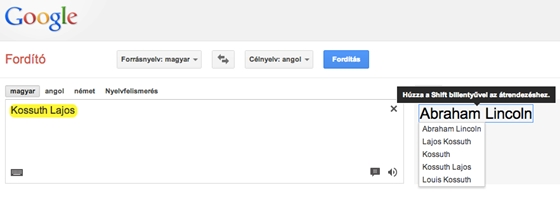All these examples have to do with students not using the tool for what it was intended for, but every now and then I come across examples that are quite humorous when Google Translate gets things completely wrong. For instance, today I wanted to see some of the differences between Czech and Slovak so I wrote out the sentence "Rád učím sa slovenčinu" (I like to learn Slovak). Google came back with "rád učim se češtinu," which means I like to learn Czech. I realize that the two languages are similar, but I find it curious that Google would use them interchangeably like that in the translation.
I've seen a couple other examples from the Hungarian news site hvg.hu. Since you'd have to know Hungarian to fully appreciate the original, I'll summarize it here. Apparently, last year, if you put the name of the famous Hungarian statesman "Kossuth Lajos" and translated it into English, it would come back with "Abraham Lincoln." Both are famous statesmen for sure, but clearly not the same person. I suppose Google got word of this because it no longer makes this mistake.
Another example from hvg.hu shows that Google apparently has a hard time staying up with current events. If you entered the French phrase "le président américain" (The American president), it would come back simply with "Bush." I checked, and it doesn't do this one anymore either, but it's still funny.
This kind of technology can be helpful when used as a starting point, but certainly not when a polished final product is expected. Sadly, it would appear that we're still years away from anything like a Babel fish or the TARDIS translation matrix. Does anyone else have examples of humorous mistranslations where Google gets it completely wrong? Comment and share if you do.
Update: I did some searching and found a few humorous ones on jackcola.org:
Update: I did some searching and found a few humorous ones on jackcola.org:
This is a quite funny one, but it kind of works for all names, but it suits Justin Bieber the best.
What to do: In Google Translator, convert the phrase “Will Justin Bieber ever hit puberty” from English to Vietnamese. Now take this text from Vietnamese, and convert it back to English. Have a read what it says.
Since this works for any name, I say it’s a little bug within Google Translator.


You can click on the individual phrases to get more translation options, and it will even translate the options back into the original language for you. Although, this doesn't tell you how the phrase would be said by a native speaker, and can help a lot with ambiguities.
ReplyDeleteYou're right, and that's clear on the Kossuth Lajos example where you can see the other possible translations beneath it. It is getting better, I suppose, though it does depend on the language. Still, I can see its value in learning a language, but not in producing a final product.
ReplyDelete